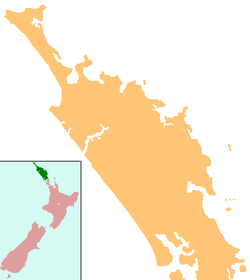Mitimiti
Mitimiti | |
|---|---|
| Coordinates: 35°25′30″S 173°16′15″E / 35.42500°S 173.27083°E | |
| Country | New Zealand |
| Region | Northland Region |
| District | Far North District |
Mitimiti is a small settlement in Northland, New Zealand. It lies close to the Warawara Forest, between the mouths of the Whangape Harbour and Hokianga Harbour on Northland's west coast, 44 km west of Kohukohu. Mitimiti is part of the Hokianga North statistical area. For demographics of this area, see Panguru.
Name
[edit]There are several stories about the origin of the name Mitimiti.
The name "Mitimiti" is thought to come from a Māori term meaning "to lick", a reference to the belief that the souls of the dead, on their way to Cape Reinga, paused here to drink at the mouth of the Mitimiti Stream.[1]
Another story is that the great chief More Te Korohanga was slain in a battle there. The warriors wanted a piece of the chief, but there wasn't enough of his body for everyone, so they licked his blood from the rocks there.[2]
History
[edit]SS Ventnor
[edit]On 27 October 1902, the SS Ventnor sank near the Hokianga Heads.[3] The ship was carrying the remains of 499 Chinese miners back to China,[4] however, none of the Chinese bodies were recovered initially.
For weeks and months following the wreck, bones washed ashore along the Hokianga, including on the beach at Mitimiti. Locals, unsure of the origins of the bones, buried them in their cemeteries.[5] In 2007, Chinese settlers began to make links between the story of the SS Ventnor and the bones, and official relationships between Te Rarawa and The New Zealand Chinese Association were formed.[6]
In 2013, a memorial gateway was unveiled in the cemetery in Mitimiti,[7] to honor the sinking. It was blessed by both Māori and Chinese [8]
Marae
[edit]The local Mātihetihe Marae is affiliated with the Te Rarawa hapū of Te Taomauī and Te Hokokeha.[9][10] The name Mātihetihe is reference to the tihetihe, or tumble weeds that grow on the sanddunes.[11]
The marae complex consists of a wharenui named Tūmoana after the captain of the Tinana canoe, and a wharekai named Ngā Ringa Rau o Te Ākau (The many hands on the shore). Next to the marae complex is Hato Hēmi a catholic church. Above the marae on a hill sits the wāhi tapu (cemetery) named Hīone.[12]
In February 2015 the marae was chosen to be part of TV3's Marae DIY.[13] The wharenui was completely refurbished on the show.[14] At the same time, the marae was connected to fibre broadband, in a project named Mititmiti on the Grid.[15]
In October 2020, the Government committed $1,407,731 from the Provincial Growth Fund to upgrade the marae and 8 other Te Rarawa marae, creating 100 jobs.[16]
Education
[edit]Te Kura o Mātihetihe is a coeducational full primary (years 1–8) school[17] with a roll of 6 students as of November 2024.[18] The school was founded in 1890, and was initially a part-time Native School taught at the Mātihetihe whare.[19]
Notable people
[edit]Artist Ralph Hotere was born in Mitimiti in 1931, and was buried there in 2013.[20] He also attended Matihetihe school.[21]
Poet Hone Tuwhare wrote poem A fall of rain at Mitimiti: Hokianga which was published in 1974 in his collection Something Nothing.[22]
References
[edit]- ^ Wise's New Zealand guide (1969) Dunedin: H. Wise & Co., p. 184.
- ^ "Mitimiti". NZ History. Retrieved 29 March 2021.
- ^ "100-Year Old Tragedy of 499 Lost Miners Premieres on Māori Television". Māori Television. Retrieved 29 April 2019.
- ^ Dastgheib, Shabnam (14 November 2014). "Shipwreck of SS Ventnor and its dead finally found". Stuff. Retrieved 30 March 2021.
- ^ "Wandering with Ancestors" (PDF). Northland NZ. Retrieved 31 March 2021.
- ^ "History". NZ Chinese Association: Ventnor Project. Retrieved 31 March 2021.
- ^ To, James. "A spiritual connection': Fate of the SS Ventnor links Chinese with Māori". Asian Media Centre. Retrieved 31 March 2021.
- ^ "Buddhist blessing for wreck souls". Northern Advocate. New Zealand Herald. 14 February 2015. Retrieved 31 March 2021.
- ^ "Te Kāhui Māngai directory". tkm.govt.nz. Te Puni Kōkiri.
- ^ "Māori Maps". maorimaps.com. Te Potiki National Trust.
- ^ "About Matihetihe Marae". Matihetihe Marae. Retrieved 31 March 2021.
- ^ "About Matihetihe Marae". Matihetihe Marae. Retrieved 31 March 2021.
- ^ Collins, Mikaela (28 February 2015). "Whanau return for a special marae makeover". Northern Advocate. New Zealand Herald. Retrieved 29 March 2021.
- ^ "Home". Matihetihe Marae. Retrieved 29 March 2021.
- ^ "CATCHING UP WITH THE REST OF THE WORLD AT HIGH SPEED". The Download. Retrieved 29 March 2021.
- ^ "Marae Announcements" (Excel). growregions.govt.nz. Provincial Growth Fund. 9 October 2020.
- ^ Education Counts: Matihetihe
- ^ "New Zealand Schools Directory". New Zealand Ministry of Education. Retrieved 1 January 2025.
- ^ Olive Harris and Chris Lancaster, ed. (2006). "Our First Voting Ladies". Remember the Hokianga. O. Harris. p. 355. ISBN 978-0-473-11859-4.
- ^ Tahana, Y. "Hotere's body arrives at Mitimiti", New Zealand Herald, 1 March 2013. Retrieved 27 June 2015.
- ^ "About Mitimiti". Archived from the original on 14 October 2007. Retrieved 19 January 2008.
- ^ "Remembering Northland". Te Ara. Retrieved 31 March 2021.

